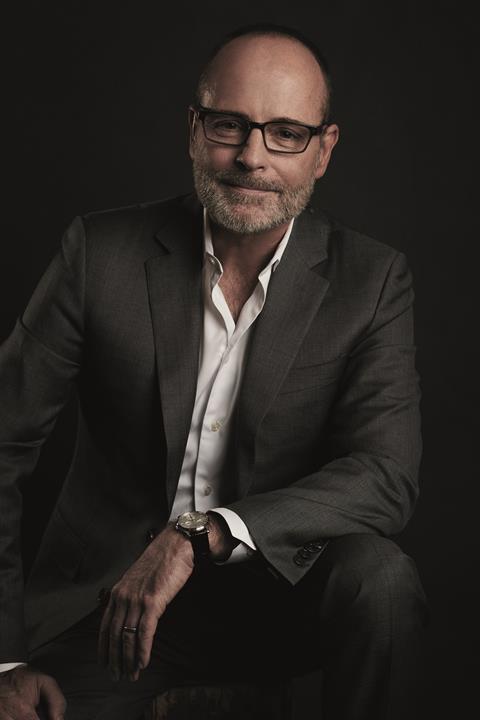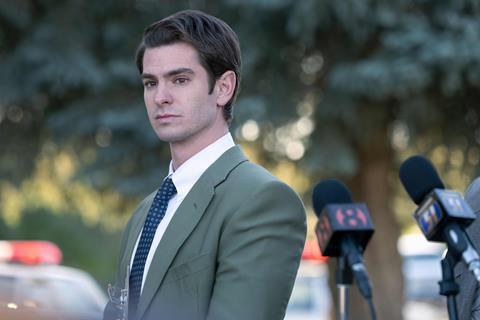In an industry awash with content, the FX Networks chair is convinced that curated and well-crafted shows can stand out and smaller brands can flourish
John Landgraf is a hard man to pin down. When Broadcast catches up with the chair of FX Networks, it’s 7.30am PST and he’s driving along the West Coast of California.
He’s travelling to Ojai, north-west of Los Angeles, for a leadership retreat arranged by recently appointed chair of Disney General Entertainment Content Dana Walden, with the senior leaders of a raft of other Disney companies.

It’s a wide-ranging powwow, he says, with Disney’s myriad companies still establishing how best to work together. He chuckles at the suggestion that world domination will be on the agenda, but he is happy to talk about the ferocity of the global streaming wars, and FX’s place in them.
FX Networks has been in transition since the brand was bought as part of Disney’s massive acquisition of Fox assets in 2019. Before the deal, Landgraf led a business that comprised basic cable channels FX, FXX and FXM, creative arm FX Productions and direct-to-consumer properties FXNOW and FX+. FX Entertainment was created as a content commissioning umbrella following Disney’s acquisition.
However, since the launch of FX on Hulu in 2020, the cable brand has become more geared towards streaming, including creating exclusive content for the majority-Disney-owned SVoD. Existing FX linear programming also goes to Hulu a day after broadcast.
Landgraf “no longer runs the [channels] business” – FX is now under the remit of Debra O’Connell and Chuck Saftler as part of Disney’s wider group of linear networks, which includes ABC, Freeform, Disney Channels and National Geographic.
“I run a curated branded programming business that includes commissioning, development and a studio,” he says. “Then I have sister studios, like 20th Television and ABC Studios, with which I also make programming. We make it for our US channels, but that programming also goes to Hulu.”
Is it reductive, then, to think of FX primarily as a pillar of Hulu? Landgraf doesn’t think so, believing the FX brand on Hulu does a crucial job in helping customers swim through a sea of content.
“The ultimate form for streaming hasn’t been fully determined. Some platforms aggregate every single kind of programme they commission or license under a single brand, and believe algorithms will help people navigate them perfectly. I’m dubious about that, because while recommendations may be helpful, there’s an emotional relationship between brands’ tonality and their consumers,” he says.
“In the long run, FX will be a brand that sits on the title of a show on a streamer”
While FX’s brand is prominent in the US on Hulu, internationally its programming is predominantly found on Disney+’s Star vertical, where the attribution comes from branding on the show tile and on-screen when the title sequence rolls. FX is available in around 80 million US homes on cable, but Landgraf is downbeat on the future of linear and notes that many of his peers, such as USA Network, TNT, TBS and Comedy Central, are dropping drama and comedy.
“I am not surprised that many of the brands driven by linear channels are exiting the scripted programming business,” he says. “The writing is on the wall. In the long run, FX will be a brand that sits above the title of a show on a streamer.”
Broad content range
One challenge facing FX Networks is the breadth of content with which it is synonymous, from gritty cop drama The Shield to “anti-sitcom” It’s Always Sunny In Philadelphia. Will that range be narrowed if brand identity is increasingly important?
Apparently not. Landgraf says the shows currently airing on FX on Hulu, such as sci-fi thriller Devs, historical drama Mrs America, true-crime detective series Under The Banner Of Heaven and comedies Reservation Dogs and The Bear, are “wildly different in tone but have common characteristics in specificity of voice”.

He continues: “Fear tends to cause people [at streamers and networks] to work backwards from their desired result. I don’t find programming that has been reverse-engineered to feel super-authentic or idiosyncratic. You have to distil the passion and intent of the creator, but not water it down – especially if it’s an unusual or untested idea.”
There is a touch of ruefulness in Landgraf’s voice when discussing FX’s access to innovative creators, particularly considering that two of its former programming heavyweights – Ryan Murphy (American Crime Story; Pose; Feud) and Donald Glover (Atlanta) – have taken lucrative deals at Netflix and Amazon Studios, respectively. Landgraf points out that FX was able to retain Glover to complete Atlanta before he exited for Amazon, and Murphy continues to make an “extraordinary amount of programming for us”, despite his Netflix deal.
“Competitors are willing to write cheques of almost infinite size,” he acknowledges. “But those are the only two who have left us. We have a better roster of talent at FX Productions than we’ve ever had in our history. And we have full access to the talent at our Disney sibling studios.”
FX’s recent first-look deals include those with Judas And The Black Messiah writer, producer and director Shaka King, Insecure veteran Melina Matsoukas, Atlanta’s Hiro Murai, The Bear’s Nate Matteson and Hannah Fidell, creator of A Teacher.

Landgraf says the grass isn’t always greener at the streamers. “It was well-sold to talent: you won’t even have commissioning executives giving you annoying notes, just make your show,” he says. “We’ve seen great editors throughout history. They are acknowledged as being of value to writers and I think we have withstood the stress of that test. I’m confident you would hear from managers, agents and lawyers that we are one of a small group of elite places that have the best process, where they want to place their talent.”
Landgraf also claims a high programming success ratio, stating that maintaining quality has become a “seven-days-a-week job”. After a recent a two-week holiday, he read 30 scripts and watched 30 roughcuts in a single week to get back up to speed.
He talks up quality control and curation, albeit FX Networks is making more content than ever before. It unveiled 30 series this year – 19 new titles and 11 returners, which is the optimal number for Landgraf.
“We asked ourselves: how much can we handle? Then we added people and restructured our organisation to manage our output,” he says, with a subtle nod to general entertainment streaming platforms. “The goal is to not to dilute the quality or water down the brand through volume. It’s an intensely interpersonal and human process – it cannot be automated. It’s really about relationships and reading and watching, listening and talking. And it’s about taking time.”

The personal relationships Landgraf has cultivated with colleagues have been disrupted this month, after his long-standing lieutenant and FX Entertainment president Eric Schrier was named by Walden in the newly created role of president of Disney Television Studios and business operations for Disney General Entertainment. Though Landgraf regards Schrier as “a protégé”, there is no ill will over his transfer and he understands Walden’s view that Schrier is “the most able executive” to help keep Disney as the leading global media company.
“I adore Eric,” Landgraf says. “He has helped me navigate a business going through transformation, but he can do more for her. I won’t say it doesn’t put more stress back on me, but I’m genuinely excited for him.”
Landgraf also talks up the “deep bench” at FX Networks, such as Gina Balian and Nick Grad, presidents of original programming at FX Entertainment, who were “absolutely ready to step up and take on the duties” Schrier left behind.
Fishing for quality
Landgraf is of the view that the industry has become a hostage to volume of content and claims that on average, the quality of scripted programming has deteriorated. “If you use a drift net in the ocean, you’ll get a lot of premium seafood – halibut or bluefin tuna – but you’ll get a lot of other stuff too,” he says. “Creators currently have real opportunities, and some make very good programming, but there’s a lot of middling and indifferent programming also being made.”
“There’s more [content] than audiences can reasonably consume – you can’t keep up with it”
It was Landgraf who coined the expression ‘peak TV’ back in 2015, but he acknowledges that accurately predicting when the bubble will burst is much like forecasting the stock market. He believes the industry is nearing the endgame though, given there are more players of scale exiting the scripted business than are entering it.
“There’s more [content] than audiences can reasonably consume – you can’t keep up with it,” he says. “However, for a long time, programming focused on gaining new subscribers, not profitability. That’s now changed. We will hit the peak soon; I’m guessing it will be in 2022. But if it’s not, I’m confident it will be relatively close.”
LANDGRAF ON…
STREAMERS CANCELLING SHOWS
“I don’t know what longterm value serialised programming has in a library if it doesn’t have an ending to it. Imagine Harry Potter if it just ended after the fourth book – you would never know what happens to Harry or Voldemort.”
THE DRIVE TO DIVERSITY
“We’ve made really good progress. Notably, more than 50% of our writing staff, across the entire span of our programming this year, were people of colour. Our shows do closely match the demographics of the country.
“We’re not quite there yet. It’s a long journey, because in some ways you’re bucking the trend of many human societies for all time.
“But we are rigorously focused on it and we make progress every single year. If you expand the meritocracy, you find merit in different places.”
BINGEING V WEEKLY SCHEDULING
“I don’t think we have a perfect formula to optimise the value of a programme. We’re in a period of experimentation.
“No distribution system will ever be perfect because you can’t predict human behaviour. People are surprising and unpredictable in what they want and how they want it.”
BEING LABELLED THE ‘MAYOR OF TV’
“There can be a performative, almost Kabuki theatre, quality to conversations executives have with reporters. I work for the shareholders of The Walt Disney Company, and I have a lot of colleagues whose needs I must consider.
“But I know a lot about the business, I enjoy talking about the strategic challenges and I’m going to have honest conversations and answer the questions asked of me. That doesn’t strike me as an unusual thing but it turns out, at least in America, it’s a big deal.”
In another dig at certain streamers, Landgraf says FX Networks’ curated slate ensures a “significantly high proportion of the shows we make succeed”, with the result that shows aren’t cancelled prematurely. “Creators get to decide when a show ends, not us,” he says.
He warns that the high-level, cost-plus model that is typical of platforms such as Netflix makes it financially unsustainable to keep renewing shows, and even those that rate are “hard to sustain”.

“Everything’s going to get cancelled after two or three seasons, and I just don’t think that reflects what people want from television,” he laments. “We’re steadfast in trying to make shows that are built to last.”
Alongside long-runners from the American Story franchise – American Crime Story, American Horror Story and spin-off American Horror Stories – Landgraf reveals that The Bear is returning for “multiple additional seasons”, and there will be more series of both Reservation Dogs and The Old Man.
Crossing borders
Landgraf says some recent FX programming aims to move beyond its US heartland thematically, such as the reboot of Simon Beaufoy’s hit film The Full Monty, which is being made in conjunction with Disney+, having been developed by FX and Searchlight Television.
“We’re highly sensitive to the crowded and competitive US market, and are increasingly focused on programming that might travel. English-speaking markets are where we’re most likely to have traction, and the UK is the largest by far,” he says.

UK-focused original Welcome To Wrexham, which follows the Welsh football club purchased by Hollywood star Ryan Reynolds, has been teased as a potential returner – though Landgraf says this depends on the success of the club.
With the drive to Ojai over, Landgraf is set to meet up with his Disney C-suite colleagues, many of whom are already at the retreat. So how on earth does he unwind? When not reading scripts, he fills his mind with non-fiction literature, inspired by his time as an anthropology university student.
“I’m interested in history, and I read a lot of science because I’m curious about our perplexing world,” he says. Even then, that feeds back to work. “It actually ends up helping when talking to writers about characters and stories, but I don’t do it for that reason.”
In a world of peak TV, perhaps there’s no escape.


































No comments yet